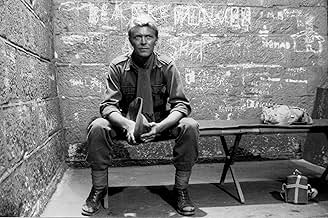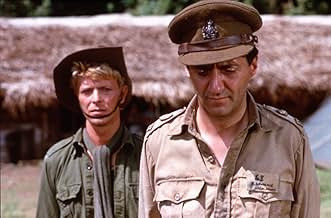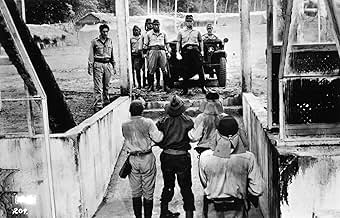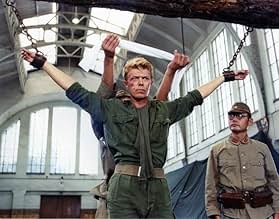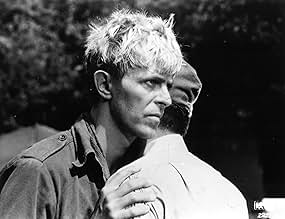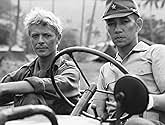Durante a Segunda Guerra Mundial, um coronel britânico tenta superar as diferenças culturais entre um prisioneiro de guerra britânico e um comandante japonês para evitar o derramamento de sa... Ler tudoDurante a Segunda Guerra Mundial, um coronel britânico tenta superar as diferenças culturais entre um prisioneiro de guerra britânico e um comandante japonês para evitar o derramamento de sangue.Durante a Segunda Guerra Mundial, um coronel britânico tenta superar as diferenças culturais entre um prisioneiro de guerra britânico e um comandante japonês para evitar o derramamento de sangue.
- Direção
- Roteiristas
- Artistas
- Ganhou 1 prêmio BAFTA
- 10 vitórias e 8 indicações no total
- Hara
- (as Takeshi)
- Kanemoto
- (as Johnny Ohkura)
- Commandant of Military Prison
- (as Yuya Uchida)
- President of the Court
- (as Ryunosuke Kaneda)
- Lieutenant Iwata
- (as Takashi Naito)
- Interpreter
- (as Rokko Toura)
- PFC Yajima
- (as Yuji Honma)
- Direção
- Roteiristas
- Elenco e equipe completos
- Produção, bilheteria e muito mais no IMDbPro
Avaliações em destaque
The acting in the movie is adequate without ever being great (the notable exception being Tom Conti who is fantastic in his role as the misunderstood titular character).
However, the movie moves beyond the acting and once you are embroiled in the atmosphere and realism you become oblivious to any acting shortcomings.
The movie must be one of the most accurate depictions of human nature in a war. It has a diverse range of characters yet none of them becomes a caricature. It certainly doesn't sink into the good vs evil mindset that many war movies do.
The violence is graphic and shocking despite lacking the visceral realism of Spielberg's later war movies.
The ending of the movie still affects me, even after repeated viewings. I still have to a lump or two to stop from crying even now.
Overall, recommended for anyone with an interest in a non-stereotypical movie about war. Not for the faint of heart though.
Sakamoto, who is also a pioneer of electronic music with the Yellow Magic Orchestra, also wrote the soundtrack, including the famous "Forbidden Colours" theme (you probably know this even if you don't know where it's from) which conjures up the atmosphere of regret, lost love and repressed heartbreak in which we see the strange, unrequited love of Sakamoto's character for Bowie's. This film is about this impossible unrequited love and about the struggle of human values in wartime. As Lawrence (Conti) says to a Japanese Officer facing execution after the war; he is now the victim of "men who are sure they are right", just as in the camp the Japanese were sure they were right. The last scene between the decent, humane Lawrence and this officer, who was by turns hearty and brutal in the camp, is one of the most heartbreaking ever committed to celluloid.
This film is memorable because of a tremendous cast (including Jack Thompson- who keeps popping up in war movies) and a wonderful soundtrack by Ryuichi Sakamoto, who also performs in the movie. The soundtrack captures the jungle feeling, coupled with Japanese moods. Forbidden colours (song) has been known to give me goosebumps.
Very much, not your average War movie, _Merry Christmas Mister Lawrence_ is excellent because it portrays the relationship between captor and captive, victor and defeated. It's a movie about human spirit and love under dangerous circumstances! It's a movie about discipline and honour, especially the different way these are perceived.
The movie looks at what it means to be human and afraid. It examines how shame and cowardice haunt most men of noble heart. It reveals our commonalities to be undeniably more powerful and real than our transitory differences. It shows how truly stupid man must be to perpetuate the horrors of warfare and to mar his soul by using power to hurt others.
It's a 10/10 in my book, but realistically speaking, if most people agreed, well, there wouldn't be any grist for this mill.
Only few works introduce a balanced vision of the conflict in the Pacific which opposed the Allies to the Japanese forces during WWII. It is not so frequent that a Japanese film director deals with what is still a critical theme in Japan. MCML is based on a novel written by Sir Laurens van Der Post, a South-African anthropologist who served in the British Army during WWII. Director Nagisa Oshima has brought many alterations to the original material. Van Der Post wrote a semi-autobiographical novel where his war-time memories are blended with his experience in Japan and his ethnological background. Oshima put most of his favorite themes into the film; he found in the novel the material to question traditional Japanese values, opposing them to Western ideology, and his film breaks free from its source but also from any definite film genre. "The Seed and the Sower" and MCML are remarkable because they present a diversity of themes reflecting their authors' preoccupations and some of the subjects they have approached in their careers.
MCML deals with people isolated from the rest of the world under artificial circumstances. As Oshima's work is closer to a psychological drama than to the war film genre, he has obviously favored unity of place to focus on a small group of characters. The plot is set in a very particular context (WWII) when Great-Britain with its allies and Japan were directly fighting against each other in Asia. The opposition between the Asians and the Westerners is a clash opposing colonial empires, races and cultures. None of the main characters is in his homeland nor defends it directly. Java (a Dutch colony) is a sort of no man's land where the British struggled to protect their colonies and where the Japanese fought to expand their conquests, hence the confrontation of two colonial empires. The presence of Korean guards is another hint to the Japanese expansion in South-Eastern Asia. Oshima gave a Japanese name to De Jong's rapist (Kanemoto), alluding to the attempt to obliterate Korea's native culture and its distinctive national features. He gives thus details on the Japanese colonizing proceedings (importation of cheap labor forces, denial of local cultures, propaganda...) yet such elements always remain in the background of the main action. A recurrent theme in some of Oshima's works is the fate of Korea during WWII and the methods used by the Japanese Imperial Army to take advantage of Korean soldiers.
Homosexuality is a key-element, much more important than in "The Seed and the Sower". The POW camp is an all-male world where most impulses are subconscious. Humiliation plays an important part in most relationships between the prisoners and their gaolers. Therefore it is not really a surprise to find that the « story within the story » about Celliers's youth is also about humiliation. The film is about the loss of dignity, not simply the loss of honor. Another recurrent theme is latent homophobia. Kanemoto and his victim, De Jong, are two oppressed characters. As a Korean soldier, Kanemoto turns his humiliation against one of the prisoners. De Jong is a kind of scapegoat who has to bear physical and moral humiliations. There is a parallel between him and Celliers's young brother who is the other scapegoat of the film (the flash-back sequence is about the boy's bullying). Kanemoto and De Jong's story bears indeed on Celliers and his relationship with Yonoi. De Jong and Celliers have to disappear so that the previous order can be restored, just as the sacrifice of a scapegoat supposedly brings back peace and order. Kanemoto and Yonoi both head for disaster once they go too far. Yonoi's attitude hints at what can happen when the fascination for Westerners is too strong. Of course the homosexual subtext concerns mainly Celliers and him. To play the two characters, Oshima deliberately chose two rock-stars (Bowie and Sakamoto) who have both androgynous features. Sakamoto named the music theme "Forbidden Colors" after the title of a novel published by Japanese writer Mishima in 1951 ("Forbidden Colors" is precisely about a young homosexual and his relations in post-war Tokyo. The title of the work is also an allusion to the colors that the emperor of Japan and his family had once the privilege to wear and that were forbidden to ordinary people, a reference to the traditional values of Japan and their disappearance after WWII). Yonoi as a character can be regarded as a metaphor for modern Japan attracted to Western lifestyles and values. Celliers is both a foil and a mirror, being his enemy and his double, with a parallel destiny. That is probably why the Japanese officer is doomed at the end of the film, a difference with Van Der Post's novel where Yonoi survives seven years of prison. Yonoi's behavior condemns him — another reference to Mishima's works where Eros and Thanatos are often related to each other. Celliers's morals are not very clear either. His arrival is heralded by Hara's sarcastic comment: « One more homosexual ». In the scene when Celliers and Lawrence talk to each other through the wall of their cells, as an introduction to his own narration coming after Lawrence's depiction of his love affair with a mysterious woman (the only heterosexual relationship mentioned in the film), Celliers states that he does not have much experience of that kind, his words being rather vague.
MCML raises also questions on the nature of war, on what makes people friends or enemies, etc. There is plenty to enjoy in this haunting film, well acted, well directed, with an unforgettable score. Very close to a masterpiece.
Você sabia?
- CuriosidadesAccording to David Bowie, Nagisa Ôshima directed the Japanese actors with great detail. But when it came to the British actors, they were told to "do whatever it is you people do".
- Erros de gravaçãoIn the final scene in the prison cell, the cross belt of Lt Col Lawrence's Sam Browne is fitted back to front.
- Citações
Col. John Lawrence: You are the victim of men who think they are right... Just as one day you and captain Yonoi believed absolutely that you were right. And the truth is of course that nobody is right...
- ConexõesFeatured in David Sylvian & Ryuichi Sakamoto: Forbidden Colours (1983)
- Trilhas sonorasRide, Ride, Ride (Celliers' Brother's Song)
Composed by Stephen McCurdy
Principais escolhas
- How long is Merry Christmas Mr. Lawrence?Fornecido pela Alexa
Detalhes
- Data de lançamento
- Países de origem
- Idiomas
- Também conhecido como
- Merry Christmas Mr. Lawrence
- Locações de filme
- Rarotonga, Ilhas Cook(prisoners camp in Java)
- Empresas de produção
- Consulte mais créditos da empresa na IMDbPro
Bilheteria
- Faturamento bruto nos EUA e Canadá
- US$ 2.306.560
- Fim de semana de estreia nos EUA e Canadá
- US$ 99.221
- 28 de ago. de 1983
- Faturamento bruto mundial
- US$ 2.376.612
- Tempo de duração2 horas 3 minutos
- Cor
- Mixagem de som
- Proporção
- 1.85 : 1
Contribua para esta página



